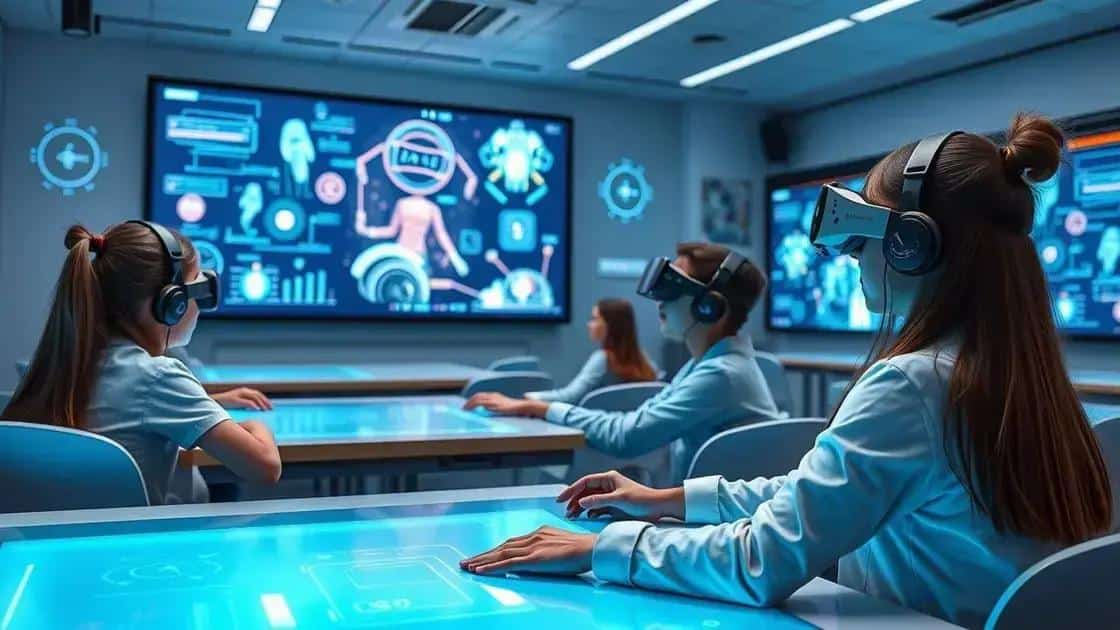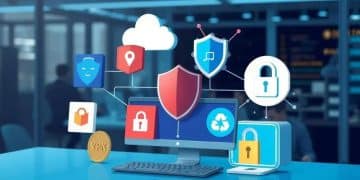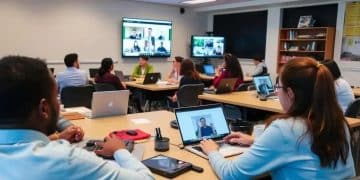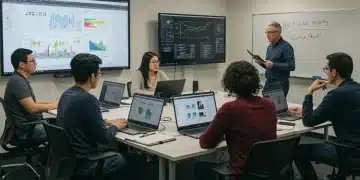AI tutoring programs trends that educators should know

AI tutoring programs are revolutionizing education by offering personalized learning experiences, improving student engagement, and enhancing classroom integration while addressing challenges like data privacy and technology access.
In recent years, AI tutoring programs trends have been gaining significant traction, changing the way students learn. These technologies offer personalized approaches that cater to individual learning needs. Have you considered how they might impact education?
Emerging technologies in AI tutoring
Emerging technologies in AI tutoring are shaping how educators teach and how students learn. These advancements are making it easier for students to receive personalized help tailored to their unique needs. As these technologies develop, they promise a more engaging learning experience.
Key Technologies Transforming AI Tutoring
Several technologies are at the forefront of AI tutoring. They enhance the learning process significantly:
- Machine Learning: This technology helps AI analyze student behavior, adjusting recommendations based on performance.
- Natural Language Processing: Enables tutoring systems to understand and respond to student inquiries in a conversational manner.
- Data Analytics: Provides insights into student progress, helping educators identify areas for improvement.
Furthermore, these tools foster collaboration among students and educators. With AI tutoring, learning becomes a shared journey rather than an isolated experience. Students benefit from immediate feedback, which helps them correct mistakes and understand concepts more thoroughly.
Impact on Learning Environments
The integration of these technologies can transform traditional classrooms into dynamic learning environments. Students engage more with interactive tools that simulate real-world challenges. Additionally, the adaptability of AI tutoring allows for learning at one’s own pace, accommodating different learning styles.
While embracing these technologies, educators also face challenges. There is a need for proper training to utilize these tools effectively. Moreover, ensuring that all students have access to necessary resources is crucial for equitable learning experiences.
Benefits of AI tutoring for students

The benefits of AI tutoring for students are numerous and impactful. These programs offer personalized learning experiences that cater to each student’s unique needs. With AI, learners can receive instant feedback and support, which helps them grasp concepts more fully.
Personalization of Learning
One major advantage is the ability to tailor educational experiences. AI systems can adapt to the learning pace of students:
- Individual learning paths: Students can focus on areas where they need the most help.
- Customizable difficulty levels: Challenges can be adjusted according to the student’s proficiency.
- Real-time progress tracking: Students can see how they are improving over time.
Moreover, AI tutoring enhances student engagement. Interactive content and gamified learning make education more enjoyable. This approach captures students’ attention and encourages them to participate actively in their learning journeys.
Accessibility and Flexibility
Another benefit is increased accessibility to learning resources. Students can access tutoring programs anytime and anywhere. This flexibility allows them to study whenever it suits their schedule, making it easier to balance schoolwork with other commitments.
Additionally, AI tutoring provides support outside traditional classroom hours. When students encounter difficult topics, they can turn to these tools for guidance at any time. This continuous support can lead to better understanding and retention of information.
Challenges in implementing AI tutoring programs
Implementing AI tutoring programs in educational settings comes with several challenges that educators must navigate. Even though these programs offer tremendous potential, it’s essential to address these hurdles to ensure their success.
Technology Integration
One of the primary challenges is integrating these technologies into existing systems. Many schools may not have the necessary infrastructure to support advanced AI tutoring. This situation might include outdated hardware or insufficient internet connectivity, which can hinder the effectiveness of these programs.
- Compatibility issues: New AI tools must work seamlessly with current learning management systems.
- Training requirements: Educators need proper training to use these tools effectively.
- Maintenance and updates: Regular updates are crucial to ensure that the AI tutoring systems function optimally.
Moreover, educators’ attitudes toward technology can greatly affect the implementation process. Some may resist adopting new tools, preferring traditional teaching methods. This resistance can slow down the transition to an AI-supported learning environment.
Data Privacy and Security
Another significant challenge involves maintaining students’ privacy and data security. As AI tutoring programs often collect personal information, there is a need to ensure this data is protected. Parents and educators alike want to be assured that sensitive information is handled responsibly.
Compliance with regulations such as FERPA (Family Educational Rights and Privacy Act) adds another layer of complexity. Schools must be cautious about how they store and use student data to avoid potential legal issues.
Finally, ensuring equitable access to AI tutoring programs is crucial. Not all students may have the same access to technology, creating disparities in learning opportunities. Addressing these inequities is essential for the successful implementation of AI tutoring solutions.
Future predictions for AI tutoring solutions

The future of AI tutoring solutions is promising and filled with exciting possibilities. As technology advances, these programs will likely become even more integral to education.
Increased Personalization
One prediction is that AI tutoring will enhance personalization based on student learning styles and preferences. Future systems might incorporate even more sophisticated algorithms to customize lessons:
- Adaptive learning paths: AI will create unique study plans for each student, adjusting in real-time as they progress.
- Enhanced feedback mechanisms: Students will receive immediate, detailed feedback that improves understanding and retention.
- More engaging content: Interactive and immersive learning experiences may become the norm, making learning fun and effective.
Additionally, incorporating virtual and augmented reality into AI tutoring could create simulations that enhance learning, making complex subjects more accessible and exciting.
Broader Accessibility
Moreover, the future may bring broader accessibility to AI tutoring programs. With advancements in mobile technology, students in remote or underserved areas could access these resources easily. Imagine a world where any student, regardless of their location, can benefit from top-notch tutoring anytime and anywhere.
As schools and educational institutions adopt these tools, there will be a significant push toward inclusivity. Ensuring that all students have equal access to technology will be essential.
Integration with Traditional Education
Future AI tutoring solutions are also expected to integrate more seamlessly with traditional classroom settings. Teachers will be able to use AI tools to complement their teaching, enhancing overall student outcomes.
From data-driven insights to dynamic teaching materials, the collaboration between educators and AI will create a more supportive learning environment. This partnership will focus on student success, allowing teachers to concentrate on fostering critical thinking skills and personal development.
FAQ – Questions about AI tutoring solutions
What benefits do AI tutoring programs offer students?
AI tutoring programs provide personalized learning experiences, helping students learn at their own pace and receive instant feedback.
How can AI tutoring improve classroom learning?
By integrating AI tutoring tools, teachers can enhance their lessons, making learning more interactive and effective for students.
What challenges might schools face when implementing AI tutoring?
Challenges include ensuring proper technology infrastructure, addressing data privacy concerns, and overcoming resistance from educators.
What does the future hold for AI tutoring solutions?
The future includes increased personalization, broader accessibility for underserved students, and better integration with traditional teaching methods.





